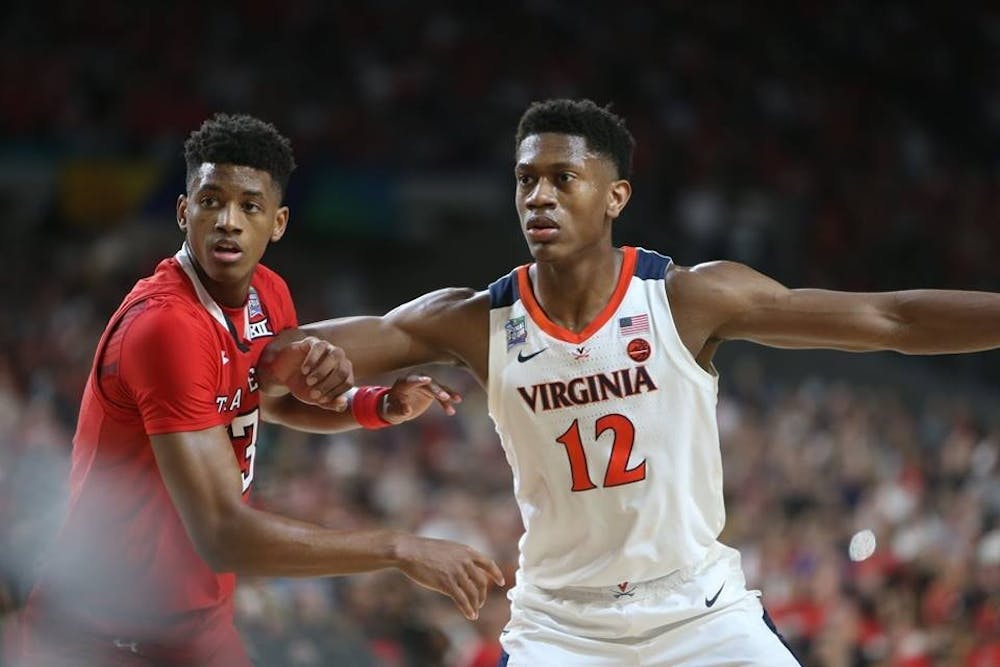Coach Tony Bennett has had many great teams during his time at Virginia and has coached many great players. Every year has been special, but it is undeniable that the 2013-14 and 2018-19 seasons and teams were particularly memorable.
2014 was a breakthrough year for the Virginia basketball program, elevating it to among college basketball’s greatest. It marked the Cavaliers’ first regular season ACC title since 2007 and first ACC Tournament title since 1976. While they lost to a talented Michigan State team in the Sweet Sixteen of the NCAA Tournament, their 72-63 ACC Tournament championship game win over Duke put the country on alert. This past week, the game was featured on the ACC Facebook page and Twitter account as a part of the “Wahoo Wednesdays” series of classic Virginia game re-airs. Several players on that 2013-14 team came on the stream to break it down, including senior guard Joe Harris, freshman guard London Perrantes, senior forward Akil Mitchell and sophomore guard Justin Anderson. Bennett also came on the stream and raised an interesting debate — would the 2014 or 2019 team win in a hypothetical matchup?
Virginia fans have been debating on social media for the last few days. Here is an in-depth look at the hypothetical contest.
Starting five
Advantage: 2019 national champions
The 2014 ACC champions had a much more consistent starting five throughout the season than the 2019 national champions. Perrantes, sophomore guard Malcolm Brogdon, Harris, Mitchell and sophomore center Mike Tobey comprised the starting five that went 25-3. The starting five for the last five games of the 2019 NCAA Tournament consisted of freshman guard Kihei Clark, junior guard Ty Jerome, junior guard Kyle Guy, sophomore guard De’Andre Hunter and junior forward Mamadi Diakite.
Both groups are very talented, but the 2019 national champions have the edge with the “big three” of Jerome, Guy and Hunter. Together, the three averaged over 44 points per game and had an offensive arsenal that few could stop. If two of them were off their game on a single night, the other would step up. All three were drafted in the 2019 NBA Draft after the season — including two in the first round — and the 2019 season was the pinnacle of all of their college careers. The two best players on the 2014 ACC champions were Harris and Brogdon, and although Harris was playing at his best level, Brogdon, while very good, had yet to reach the height of his college career. Both Clark and Perrantes primarily played the role of calm distributor for veteran scorers and had yet to establish their best scoring skills. Tobey and Mitchell were both solid post players, just like Diakite, able to guard the best forwards and provide some inside scoring. Diakite was a better scorer than Mitchell, with more range on his jumper at the time and ability to play out on the perimeter.
Depth
Advantage: 2014 ACC champions
The 2014 ACC champions had Anderson — the 2014 ACC Sixth Man of the Year — coming off the bench, who averaged 7.8 points per game. An instant spark, Anderson provided great defense, hustle and athleticism off the bench for the Cavaliers. Junior guard Braxton Key played a similar role for the 2019 national champions and received votes for the 2019 ACC Sixth Man of the Year. Anderson, however, was a more dynamic player than Key. In addition to Anderson, sophomore transfer forward Anthony Gill came off the bench for the 2014 ACC champions. Gill was third on the team in scoring with 8.6 points per game and third on the team in rebounding with 4 rebounds per game. The 2019 national champions have no one who provided Gill’s tough, physical scoring inside. Against Duke in the ACC championship game, Gill’s physicality afforded him 17 free throw attempts. He finished with 12 points and 7 rebounds. Junior forward Darion Atkins also received some minutes for the 2014 team, providing great defense and athleticism. Sophomore forward Jay Huff and senior center Jack Salt — who started for most of the season — similarly provided depth for the 2019 national champions, but did not have the same combined impact as Anderson, Gill and Atkins. Sophomore forward Evan Nolte also contributed some perimeter shooting and length defensively for the very deep 2014 team.
Offense
Advantage: 2019 national champions
The 2019 national champions averaged 71.4 points per game, the most by a Bennett team. Hunter, Jerome and Guy were all able to create their own offense — Hunter’s ability to create one-on-one was especially useful — which helped in late-game situations. Even when Bennett’s mover-blocker offense broke down or was stymied, the individual offensive talent of those players allowed Virginia to continue to score. This proved to be especially crucial in the NCAA Tournament, when the Cavaliers won three consecutive games with late comebacks, including the national championship game. The national champions shot 39.5 percent from three, seventh best in the nation. There were times when it seemed Virginia could not miss from behind the arc, like when the Cavaliers shot 72 percent from three and tied a school record with 18 made threes in a 79-53 win over Syracuse. Besides the “big three,” Diakite provided a nice scoring boost inside for the national champions, which he especially showed in the NCAA Tournament.
The 2014 ACC champions had their fair share of good scorers, but had fewer players with the ability to create their own offense. Virginia worked very well in the mover-blocker team offense and averaged 66.2 points per game. Brogdon was able to create off the dribble and get to the foul line, but he improved more at that later in his career at Virginia. Harris could also get to the rim and was an exceptional shooter. Harris shot 40 percent from three in 2014, and while he made 1.9 threes per game, that pales in comparison to Guy’s 3.2 made threes per game. The inside scoring punch of Gill, Mitchell and Tobey cannot be matched by the 2019 team, but the dynamic individual talent of the “big three” cannot be matched by the 2014 Cavaliers. The national champions have the edge here.
Defense
Even
All Bennett teams are stellar defensively, and these two teams were no different. The 2014 ACC champions allowed 55.7 points per game, the best in the nation, and the 2019 Cavaliers allowed 56.1 points per game, also best in the nation. Statistically speaking, these were not even Bennett’s two best teams defensively, but both played the pack line very well and had some elite individual defenders.
Mitchell was a strong on and off ball defender and was named to the ACC All-Defensive Team in 2014. While they did not receive accolades in 2014, Atkins was co-ACC Defensive Player of the Year and the Lefty Driesell Defensive Player of the Year — given to the best defender in the country — in 2015 and Brogdon was co-ACC Defensive Player of the Year in 2015 and ACC Defensive Player of the Year in 2016.
Hunter was the ACC Defensive Player of the Year in 2019, and his athleticism and versatility were critical for the national champions. Key is also a strong defender, and Diakite was named to the ACC All-Defensive Team in 2020. Jerome and Guy were solid defenders, having improved significantly from their freshman years, and Clark is a very feisty on-ball defender.
Experience
Even
Both teams were fairly experienced. The 2014 ACC champions would seem to have the edge with Harris and Mitchell as seniors and co-captains. However, even though senior captain Salt did not start for the majority of the NCAA Tournament, the 2019 national champions still had a great deal of experience, and it was the kind of experience that made them so resilient. Besides Clark and Hunter — who redshirted his freshman year — every player in Virginia’s starting five was an upperclassman. Furthermore, Jerome, Guy and Diakite played in the NCAA Tournament the two prior years and all played in the Cavaliers’ stunning upset loss to UMBC in 2018. The group had been through a lot, and it prepared them for the challenges of the 2019 NCAA Tournament.
Matchups
Advantage: 2019 national champions
There are several interesting potential matchups in a hypothetical contest between the two teams. The key for the 2014 ACC champions would be to slow down the “big three” and the national champions would have to find an answer for Harris and Brogdon.
Perrantes and Clark is a clear matchup. As long as Clark contests Perrantes at the three-point line — Perrantes shot a team-best 43.7 percent from three — this should be an even contest, with Clark being the quicker and stronger defender and Perrantes having a more complete offensive skill set.
Brogdon and Jerome would be another natural matchup, both tall, crafty guards with facilitating and scoring abilities. Brogdon would use his strength advantage to try to get by Jerome to slash to the basket, and Jerome’s herky-jerkiness would be tough for Brogdon to defend. This is an even battle with 2014 Brogdon and 2019 Jerome. Perrantes could also spend time guarding Jerome and Hunter could shift to Brogdon if he gets going.
Guy and Harris could guard each other, although Harris could take advantage of his size advantage over Guy and Harris admitted over the livestream that he might grow tired of chasing Guy through screens. Brogdon and Anderson could also spend time guarding Guy. Anderson’s aggressive closeouts could be especially disruptive when guarding Guy. Key could shift to Harris if size becomes an issue.
The problem for the 2014 ACC champions would be slowing down Hunter, and there are no clear answers. Mitchell would have to be up to the task, and he could prove to be capable, although defending Hunter on the perimeter would be tough. Anderson and even Atkins could also potentially match up with Hunter, but the current Atlanta Hawks player has the edge in any matchup with his athleticism, versatility and three-point shooting stroke.
In the post, Diakite and Gill would be an even match, and Salt would likely receive significant playing time matched up against Tobey.
Overall, it is close, but the national champions come out on top.
The outcome
2019 national champions win a close game
In the end, the 2019 national champions’ late-game heroics, individual offensive talent and three-point shooting prowess would overcome the 2014 ACC champions’ pack line defense and stellar depth.
But both teams will always hold a special place in the program’s history and embody what makes Bennett Virginia teams great.







